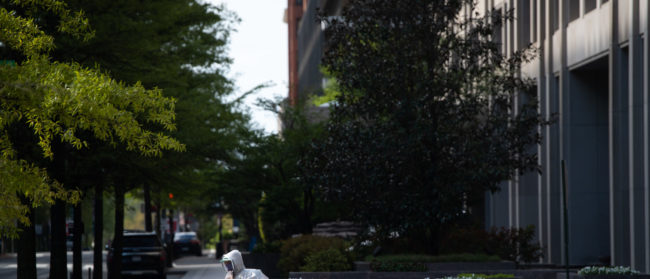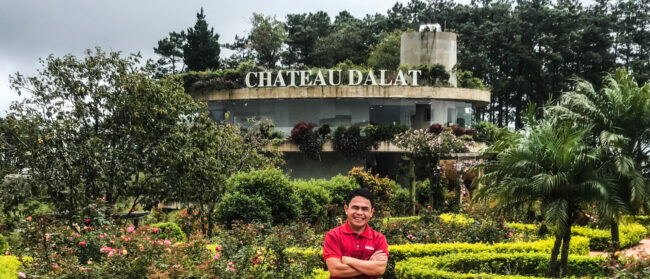Nestled in the heart of Phnom Penh’s fashionable Tonle Bassac area sits Samai Distillery. Wooden barrels pile high at Cambodia’s first rum distillery, which since 2014 has made three different types of the liquor based on local flavours. But as of 2020, in response to a rapidly evolving global situation, Samai has added a fourth type of alcohol to its production line: hand sanitiser.
If you’d told Samai’s co-founder and director Antonio López de Haro that the current alcohol of choice would be sanitiser, he’d likely not have believed you.
“Our goal for 2020 was to expand our production capacity significantly,” Antonio, co-founder and director of Samai Distillery, explained to Southeast Asia Globe. “We’ve been receiving requests for our rum from around the world and our priority is to increase our production capacity to answer those demands.”
While that goal still stands, the current state of play within the drinks industry would not be what Antonio would have envisioned. With Covid-19 pausing business around the world, the drinks industry has had to put on the brakes too. Or, at least, move the goalposts.
“Due to the situation, we started to take extra measures that had a lot of impact on our finances, such as closing the bar on Thursday night,” he said, referring to an open night his distillery used to hold.
But it hasn’t been all bad news.
“Considering that our rums are aged for at least one year, increasing our production capacity will not have a direct impact – most of the result will be seen after two years,” explained Antonio, who exports to Singapore and Europe.
Like a number of distilleries, however, one new item alongside their rum has popped onto the menu as a response to the coronavirus, and one that you wouldn’t necessarily want to substitute into your Mojito – hand sanitiser.



Left: Samai’s co-founder and director Antonio López de Haro. Photos: Supplied
Seeing how serious it got, and how hard it is to find hand sanitiser at a reasonable price, having all the equipment here to produce alcohol, it made sense for us to contribute
“It was just an idea to help with the current crisis, once we saw that supply was very tight,” Antonio said. “We sell it in small batches and almost at production cost, so we are not making this for profit, just to help the people in Phnom Penh as much as we can.”
Samai realised there was a lack of sanitiser and looked at how to help remedy that.
“Seeing how serious it got, and how hard it is to find hand sanitiser at a reasonable price, having all the equipment here to produce alcohol, it made sense for us to contribute as much as we could to help our community,” said Antonio.
With bottles of sanitiser ballooning in price, Samai wanted to produce an affordable one for locals. Before the pandemic, a 500ml would typically sell for $7 – that has now doubled. Samai sells theirs for the lowest price that still enables production to continue, while still remaining affordable – $3.50. Buyers can top up their reusable bottle at the distillery for a dollar.

“We wish we could offer it for free but being a small distillery, we have to at least cover our costs,” Antonio explained. “So far they have been mostly sold at our shop to general customers, as well as given to our staff and some other organisations.”
It wasn’t difficult for Samai to quickly produce the sanitiser. Three kinds of alcohol are produced during the distilling process: the head, the heart and the tails. The heart is what’s used for Samai’s rum while the head – normally reserved for cleaning equipment – is produced as a normal byproduct and is now used for the sanitiser.

“It’s actually a great way to recycle all the alcohol we’re not using in production,” explained Antonio.
But while Samai staff were able to quickly reconfigure the distillery to produce sanitiser, it is not all straightforward.
Sourcing plastic containers to bottle the sanitiser was problematic. “They’re limited, and suppliers are taking advantage of the rise in demand, therefore increasing the prices dramatically to the point where it makes it uneconomical to continue producing these products,” said Antonio. “The availability of raw ingredients is limited and very high in price.
But Samai is considering maintaining the production line even after the pandemic passes. While visitors won’t be seeing it on menus any time soon, the coronavirus has sparked a rethink in what can be done with alcohol’s supposed ‘scraps’.
“It’s something we’ve been discussing with some local pharmacies to distribute it in the long term,” Antonio said.


